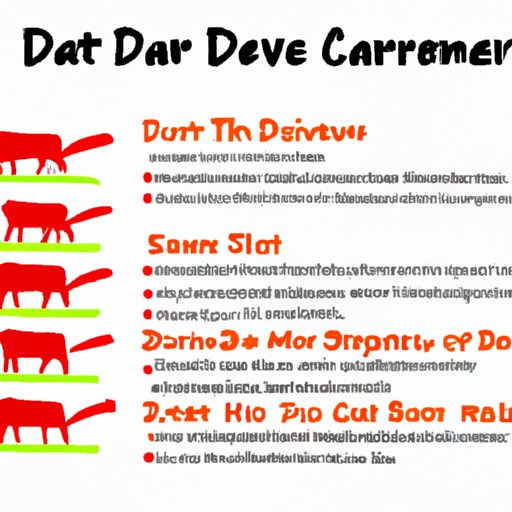Introduction
The carnivore diet is a dietary pattern that involves eating only animal products, such as meat, fish, eggs, dairy, and some other animal-based foods. It is a relatively new diet, first gaining popularity in 2018, and has quickly become one of the most talked-about diets today. The purpose of this article is to explore the basics of the carnivore diet, its potential benefits, and how to make it sustainable long-term.

Overview of the Carnivore Diet: What it is and How to Follow It
The carnivore diet is a restrictive diet that eliminates all plant-based foods, including fruits, vegetables, legumes, grains, nuts, and seeds. This means that the only foods you can eat on the carnivore diet are animal products, which include beef, pork, lamb, chicken, turkey, fish, shellfish, eggs, and dairy. You can also include other animal-based foods, such as organ meats, bone broth, and certain types of fats, such as lard, tallow, and ghee. Despite its restrictive nature, the carnivore diet does allow for some flexibility, as you can choose to eat any combination of these foods as long as they are from animal sources.

Exploring the Benefits of a Carnivore Diet
The potential benefits of the carnivore diet are numerous. For starters, it is a very satiating diet due to its high protein content, which helps keep hunger at bay and makes it easier to stick to. A study published in the journal Nutrition & Metabolism found that a high-protein diet was associated with decreased appetite and greater feelings of fullness.
The carnivore diet is also rich in essential vitamins and minerals, including iron, zinc, calcium, and vitamin B12. These nutrients are important for overall health and can help reduce the risk of certain diseases, such as heart disease and type 2 diabetes. Additionally, the carnivore diet is low in carbohydrates, which can be beneficial for those looking to lose weight or reduce their risk of developing metabolic diseases.
An In-Depth Look at the Macronutrients in a Carnivore Diet
One of the main benefits of the carnivore diet is its high protein content. Protein is an essential macronutrient that is necessary for building and maintaining muscle mass, as well as other bodily functions. According to a recent review published in the Journal of the American College of Nutrition, consuming adequate amounts of protein is key for optimal health and performance.
The carnivore diet is also high in healthy fats, such as omega-3 fatty acids. These fats can help reduce inflammation, improve blood sugar control, and reduce the risk of heart disease. Additionally, the carnivore diet is rich in vitamins and minerals, such as iron, zinc, magnesium, and vitamin B12, which are all essential for proper functioning of the body.

Common Questions About the Carnivore Diet Answered
One of the most common questions about the carnivore diet is whether or not it is safe. While there is no definitive answer to this question, research suggests that the carnivore diet can be safe when followed correctly. A study published in the journal Nutrients found that a well-planned carnivore diet can provide all the essential nutrients needed for optimal health.
Another common question is whether or not the carnivore diet is sustainable long-term. While it may be possible to sustain the carnivore diet over the long-term, it is important to note that it is a very restrictive diet and may not be suitable for everyone. It is important to consult with a healthcare professional before starting a carnivore diet to ensure it is right for you.
Finally, it is important to consider the potential downsides to eating a carnivore diet. One downside is that it eliminates many plant-based foods, which contain important vitamins, minerals, and antioxidants that are necessary for optimal health. Additionally, it may be difficult to meet your fiber needs on a carnivore diet, as fiber is only found in plant-based foods. Therefore, it is important to supplement with fiber if necessary.
Sample Meal Plan for Starting a Carnivore Diet
If you’re interested in trying the carnivore diet, here is a sample meal plan to get you started:
Breakfast Ideas
• Eggs cooked in butter or ghee
• Steak and eggs
• Bacon and eggs
• Ground beef and eggs
Lunch Ideas
• Grilled salmon
• Roast beef
• Chicken salad
• Tuna salad
Dinner Ideas
• Grilled steak
• Baked salmon
• Grilled chicken
• Beef stew
Tips for Making a Carnivore Diet Sustainable Long-Term
If you’re interested in following a carnivore diet long-term, there are a few things you can do to make it more sustainable:
Variety is Key
The carnivore diet can become monotonous if you don’t vary your food choices. Try to incorporate different cuts of meat, as well as different types of seafood, to add variety to your meals.
Eat Seasonally
Eating seasonally can help make the carnivore diet more sustainable by adding variety to your meals. Eating seasonally also ensures that you’re getting the freshest and most nutrient-dense foods available.
Supplement as Needed
Finally, it is important to supplement as needed to ensure you are meeting your nutritional needs. Common supplements on the carnivore diet include omega-3 fatty acids, vitamin D, and probiotics.
Conclusion
The carnivore diet is a restrictive diet that eliminates all plant-based foods. It can offer a number of potential benefits, such as improved satiety and increased intake of essential vitamins and minerals. However, it is important to consider the potential downsides before starting a carnivore diet, as well as how to make it sustainable long-term. With the right approach, the carnivore diet can be an effective way to improve your health and wellbeing.
(Note: Is this article not meeting your expectations? Do you have knowledge or insights to share? Unlock new opportunities and expand your reach by joining our authors team. Click Registration to join us and share your expertise with our readers.)
